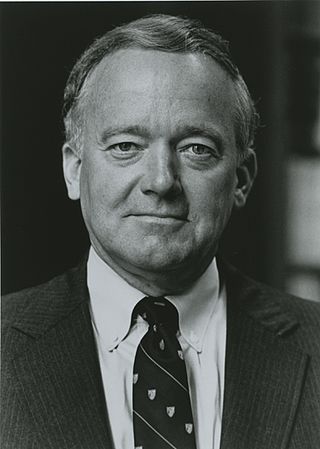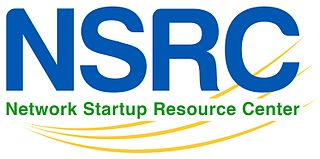The National Science Foundation Network (NSFNET) was a program of coordinated, evolving projects sponsored by the National Science Foundation (NSF) from 1985 to 1995 to promote advanced research and education networking in the United States. The program created several nationwide backbone computer networks in support of these initiatives. Initially created to link researchers to the NSF-funded supercomputing centers, through further public funding and private industry partnerships it developed into a major part of the Internet backbone.

The Cornell University Center for Advanced Computing (CAC), housed at Frank H. T. Rhodes Hall on the campus of Cornell University, is one of five original centers in the National Science Foundation's Supercomputer Centers Program. It was formerly called the Cornell Theory Center.

Internet2 is a not-for-profit United States computer networking consortium led by members from the research and education communities, industry, and government. The Internet2 consortium administrative headquarters are located in Ann Arbor, Michigan, with offices in Washington, D.C., and Emeryville, California.

David J. Farber is a professor of computer science, noted for his major contributions to programming languages and computer networking. He is currently the Distinguished Professor and Co-Director of Cyber Civilization Research Center at Keio University in Japan. He has been called the "grandfather of the Internet".
Libraries operate as part of the technological infrastructure that supports the National Research and Education Network (NREN), acting as an electronic safety net for the American public to guarantee basic access to electronic information. Public libraries are in particular capable to take on this role, as they already serve such a role in a print-based society. They not only provide electronic information and network connectivity but also provide training and education to the public on how to access and use network information.
eCorridors is an information technology program to promote and facilitate broadband access for communities of Virginia and nearby areas. It was developed by faculty at the Virginia Polytechnic Institute and State University (VT) in the spring of 2000.
Glenn Ricart is a computer scientist. He was influential in the development of the Internet (ARPANET) going back to 1969 and early implementation of the TCP/IP protocol. Since then he has been active in technology and business as well as donating his time to philanthropic and educational movements.
Stephen South Wolff is one of the many fathers of the Internet. He is mainly credited with turning the Internet from a government project into something that proved to have scholarly and commercial interest for the rest of the world. Dr. Wolff realized before most the potential in the Internet and began selling the idea that the Internet could have a profound effect on both the commercial and academic world.

Merit Network, Inc., is a nonprofit member-governed organization providing high-performance computer networking and related services to educational, government, health care, and nonprofit organizations, primarily in Michigan. Created in 1966, Merit operates the longest running regional computer network in the United States.
Ira H. Fuchs is an internationally known authority on technology innovation in higher education and is a co-founder of BITNET, an important precursor of the Internet. He was inducted into the Internet Hall of Fame in 2017. Since 2012 he has been President of BITNET, LLC a consulting firm specializing in online learning and other applications of technology in higher education.

Joe Billy Wyatt served as the sixth chancellor of Vanderbilt University from 1982 to 2000. Prior to his appointment at Vanderbilt, Wyatt was the Vice President for Administration at Harvard University
Chen Wen-tsuen is an ethnic Taiwanese computer scientist, a distinguished research fellow at the Academia Sinica and a lifelong national chair of the Ministry of Education, Taiwan. From 2006 to 2010, he was the president of the National Tsing Hua University, a premier research university in Taiwan.
Advanced Network and Services, Inc. (ANS) was a United States non-profit organization formed in September, 1990 by the NSFNET partners to run the network infrastructure for the soon to be upgraded NSFNET Backbone Service. ANS was incorporated in the State of New York and had offices in Armonk and Poughkeepsie, New York.
Charles J. Henry is President of the Council on Library and Information Resources (CLIR), located in Washington, D. C. Prior to that he served as Vice Provost and University Librarian at Rice University, where he also served as Vice President and Chief Information Officer for several years.

Dennis M. Jennings is an Irish physicist, academic, Internet pioneer, and venture capitalist. In 1985–1986 he was responsible for three critical decisions that shaped the subsequent development of NSFNET, the network that became the Internet.

Doug Gale was an early developer of the Internet. Gale earned a Ph.D. in physics from Kansas State University in 1972, and served as a tenured associate professor of physics at East Texas State University for eight years, during which time his research interests shifted to computer science.
Daniel E. Atkins III is the W. K. Kellogg Professor of Community Informatics at University of Michigan.

The Network Startup Resource Center (NSRC) is a nonprofit organization, formed in 1992 and based at the University of Oregon. The organization supports deployment of Internet research and education networks in academic institutions and non-governmental organizations throughout the Asia Pacific region, Africa, Latin America and the Caribbean, and the Middle East. NSRC receives major funding and in-kind donations from the National Science Foundation (NSF), Google and Google.org, Cisco, O'Reilly Media, Vint Cerf, the Richard M. Karp Foundation, IDRC, Internet Society (ISOC), and many other institutional and private donors.

Farnam Jahanian is an Iranian-American computer scientist, entrepreneur, and higher education leader. He serves as the 10th president of Carnegie Mellon University.









